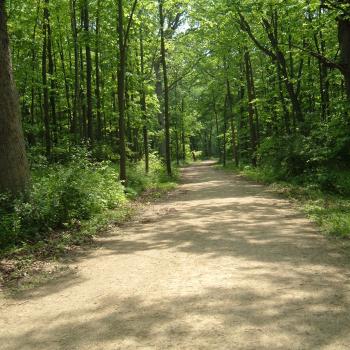I keep dribbling out observations from the book I’m reading, Robert Putnam’s Our Kids. Here’s another one:
One of Putnam’s key points is that in the last two generations there’s been a significant divergence in the family lives of the college-educated/middle-class and the high school-educated/working-class. The former are more likely to attend church, have stable marriages (or any marriage at all), read to their children, encourage them to participate in after-school activities, have high expectations for their academic success, etc. — and he illustrates by means of what he calls “scissors graphs” the divergence since the 70s or 80s.
I was talking about this with my husband on our after-dinner walk and this was his observation:
On my father’s side, his parents were high school graduates. Grandpa worked at the Gates Rubber Plant (and avoided the draft because his job was crucial to the war effort), and, having come from farm families but settling in the Denver area, they saved enough to buy enough acreage to have, basically, a hobby farm, with livestock and chickens for egg money; they sent their kids to Catholic schools, and they participated in 4H. As the suburbs moved in, they later developed the land into houses, which gave them quite a healthy nest egg for retirement. Now, neither of them were college-educated, but they were very literate. After they retired, he spent some time in the summer, for many summers, with a dinosaur dig in South Dakota. Of their five children — my dad and his siblings — 3 (or 4, I’m not sure about Uncle Soren) went to college, with some parental assistance but mostly working their way through.
On my mother’s side, again high school graduates only. YaYa was a sales clerk at a department store after the kids were grown, and Papou, who came over from Greece immediately upon graduating high school there, was a barber first, then a life insurance salesman (I believe the traditional door-to-door selling type). I don’t recall the house being particularly full of books, but there’s a photograph of Papou as a young man, in a play in community theatre, and for many years, he played the violin in the St. Louis Philharmonic, a all-volunteer but high-calibre orchestra. Of their five children, three graduated college — my uncle, and two of my aunts who became schoolteachers, in part because my grandfather, being from the Old Country, was limited in the number of occupations he was willing to support his daughters undertaking. (My mom, the oldest, went to nursing school, which at the time was more of an earn-your-way apprenticeship, and afterwards helped my youngest aunt with tuition money; and the second-youngest of the five started but didn’t finish as she dropped out to get married.)
(For a chronological reference point, both my parents were born in 1939.)
In other words, in the generation prior to the widespread availability of college, there were plenty of families with mindsets and attitudes and behaviors that we now associate with the college-educated, even though they never set foot on a college campus — and, let’s face it, with the intelligence that would have taken them to college, in difference circumstances. But that cohort, once college became more accessible, sent their own children to college, and the era, if you will, in which there were an appreciable number of intelligent, but non-college-educated, blue-collar workers, was, to a large degree, over.
Putnam says that in the past generation or two there’s been a significant widening of the geographical divide between rich and poor, between the college- and the high school-educated. But to take this a step further, I suspect that another key change in America since the 50s, say, is that there’s been a significant narrowing of what it means to be working-class/non-college-educated.
I know, this point has probably been made by many others, and more articulately than in this little post, but it’s something to chew on, and perhaps you, readers, have similar stories to share.











